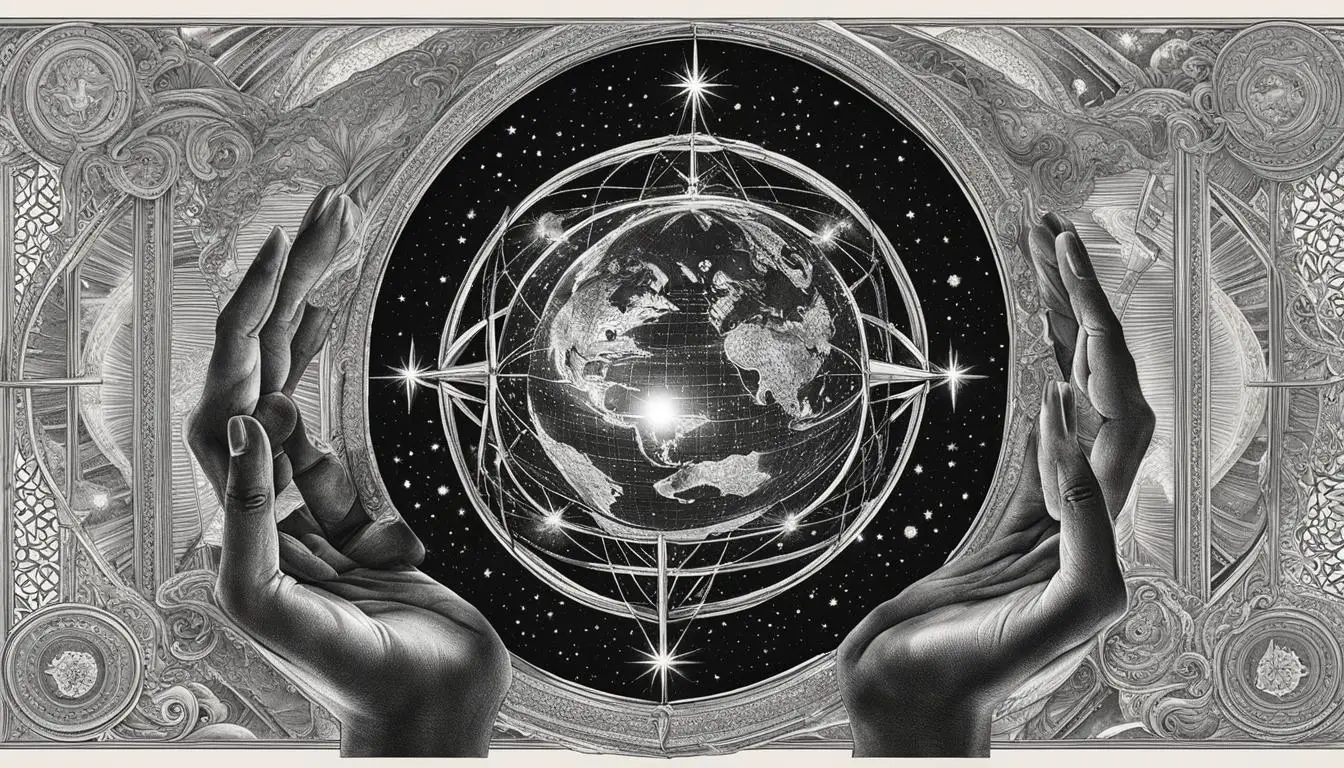The Bible offers profound insights into the definition of the world, providing a unique perspective on its meaning and significance. By exploring various scriptures and interpretations, we can gain a comprehensive understanding of the world according to biblical teachings.
Key Takeaways:
- The word “world” has its roots in Old English, derived from the combination of “weorold,” meaning “age,” and “eal,” meaning “all.”
- The Hebrew definition of the world emphasizes its vastness, depth, and enduring nature.
- The Greek definition of the world highlights its intricate design and interconnectedness.
- Bible verses provide wisdom, guidance, and inspiration regarding our understanding of the world.
- Scholars and theologians offer valuable insights and interpretations of the biblical definition of the world.
The Etymology of the Word “World”
The word “world” holds rich historical and linguistic significance. Its etymology can be traced back to Old English, where it is derived from the combination of two words: “weorold,” meaning “age,” and “eal,” meaning “all.” This amalgamation of meanings gives the word “world” its comprehensive definition. In essence, it encompasses the entirety of human existence, encompassing both the physical realm and the people who inhabit it.
Understanding the etymology of the word “world” is crucial in comprehending its biblical concept. It allows us to grasp the depth and breadth of its meaning, going beyond a surface-level interpretation. From its origin, we can infer that the word “world” represents the collective experience of time and space, encapsulating the ever-changing nature of life and the world we inhabit.
| Etymology | Meaning |
|---|---|
| Old English | “weorold” (age) + “eal” (all) |
| Biblical Interpretation | The entirety of human existence, incorporating the physical realm and its inhabitants. |
The etymology of the word “world” serves as a foundation for exploring its significance in biblical teachings. It sets the stage for a deeper dive into the Hebrew and Greek definitions of the world, shedding further light on its complexities and implications within a spiritual context. By delving into these dimensions, we can gain a more comprehensive understanding of the biblical definition of the world and its profound implications for our lives.
The Hebrew Definition of the World
In the Hebrew language, the word for “world” is “olam.” This term carries a multifaceted meaning that encompasses both a temporal and a spatial dimension. When referring to time, “olam” signifies a duration that extends beyond the present moment, often used to describe an indefinite period or even eternity. It conveys the sense of timelessness and enduring nature of the world. In the spatial sense, “olam” connotes a vast and expansive realm, emphasizing the depth and breadth of the world.
Within the biblical context, the Hebrew definition of the world underscores its divine creation and the profound significance it holds in God’s plan. The world is not merely a random occurrence or a product of chance, but a deliberate and purposeful creation by the Creator. It reflects the majestic attributes of God and serves as a canvas for His glory to be revealed. The Hebrew understanding of the world invites us to contemplate its grandeur and marvel at the intricate design woven into every aspect of creation.
Furthermore, the Hebrew concept of the world highlights the interconnectedness of all existence. It acknowledges the interplay between the physical and spiritual realms, recognizing that the world is not confined to what is visible or tangible. Rather, it encompasses the unseen forces and spiritual dimensions that shape and influence our lives. This holistic understanding invites us to engage with the world not only on a material level but also on a deeper, spiritual level, recognizing the divine presence that permeates all aspects of creation.
| Key Points | Hebrew Definition of the World |
|---|---|
| Temporal Dimension | Signifies an indefinite period or eternity |
| Spatial Dimension | Emphasizes the vastness and depth of the world |
| Divine Creation | Reflects God’s intentional design and purpose |
| Interconnectedness | Acknowledges the spiritual dimensions impacting the world |
As we delve deeper into the biblical understanding of the world, we gain a rich appreciation for its multifaceted nature. The Hebrew definition invites us to explore the world with a sense of wonder, recognizing its timelessness, vastness, and divine purpose. It calls us to engage with the world not only through our physical senses but also through a spiritual lens, embracing the interconnectedness of all creation.
The Greek Definition of the World
The Greek language offers a unique perspective on the definition of the world as portrayed in the Bible. In Greek, the word for “world” is “kosmos.” Unlike its English counterpart, the Greek term conveys more than just the physical dimension of the world. It encompasses the idea of order, arrangement, beauty, and harmony. The Greek definition of the world highlights its intricate design and interconnectedness.

The biblical Greek meaning of the world goes beyond the material aspects and delves into the underlying structure and purpose. It emphasizes the inherent order and balance in the world, connecting the physical realm to the moral and spiritual realms. This understanding invites us to contemplate the intention and wisdom behind the creation of the world, fostering a sense of awe and reverence for its divine origin.
The Greek Definition of the World in Scripture
Throughout the Bible, we find references that reflect the Greek definition of the world. In John 3:16, Jesus declares, “For God so loved the world that he gave his one and only Son, that whoever believes in him shall not perish but have eternal life.” Here, the term “world” encompasses not only humanity but also the entire cosmos, emphasizing the all-encompassing love and salvation offered by God.
A Deeper Perspective
Exploring the Greek definition of the world enriches our understanding of biblical teachings. It underscores the intricate interconnectedness of all things and the divine order that sustains creation. By considering the Greek perspective, we gain a deeper appreciation for the beauty, complexity, and purpose of the world as revealed in the Scriptures.
| Key Points | Biblical Greek Definition of the World |
|---|---|
| Meaning | Order, arrangement, beauty, and harmony |
| Scope | Includes physical, moral, and spiritual dimensions |
| Significance | Reflects the intentional design and purpose of creation |
Bible Verses on the World
The world is a central theme in the Bible, with numerous verses providing insights into its meaning and significance. These scriptures offer wisdom, guidance, and inspiration regarding our understanding of the world and its relationship to God. Let’s explore some key Bible verses on the world:
1. Genesis 1:1
In the beginning, God created the heavens and the earth.
This verse marks the beginning of the Bible and highlights God’s act of creation, where He formed the world and everything in it. It establishes the foundation for understanding the world as God’s handiwork.
2. John 3:16
For God so loved the world that he gave his one and only Son, that whoever believes in him shall not perish but have eternal life.
This verse emphasizes God’s love for the world and His redemptive plan through Jesus Christ. It emphasizes the ultimate purpose of the world, which is to receive salvation and eternal life through faith in Jesus.
3. Romans 12:2
Do not conform to the pattern of this world, but be transformed by the renewing of your mind. Then you will be able to test and approve what God’s will is—his good, pleasing and perfect will.
In this verse, the apostle Paul encourages believers to resist the negative influences of the world and instead be transformed by renewing their minds according to God’s will. It highlights the importance of discernment and aligning one’s thoughts and actions with God’s purposes.
4. 1 John 2:15-17
Do not love the world or anything in the world. If anyone loves the world, love for the Father is not in them. For everything in the world—the lust of the flesh, the lust of the eyes, and the pride of life—comes not from the Father but from the world. The world and its desires pass away, but whoever does the will of God lives forever.
This passage cautions against worldly desires and urges believers to prioritize God’s will over the transient pleasures and pursuits of the world. It reminds us of the eternal nature of God’s kingdom and the impermanence of worldly pursuits.
These are just a few examples of Bible verses that provide insights into the world and its significance. Each verse offers a unique perspective on our relationship with the world and with God. By studying these scriptures, we can deepen our understanding of the world according to biblical teachings and apply their wisdom to our lives.
| Verse | Scripture |
|---|---|
| Genesis 1:1 | In the beginning, God created the heavens and the earth. |
| John 3:16 | For God so loved the world that he gave his one and only Son, that whoever believes in him shall not perish but have eternal life. |
| Romans 12:2 | Do not conform to the pattern of this world, but be transformed by the renewing of your mind. Then you will be able to test and approve what God’s will is—his good, pleasing and perfect will. |
| 1 John 2:15-17 | Do not love the world or anything in the world. If anyone loves the world, love for the Father is not in them. For everything in the world—the lust of the flesh, the lust of the eyes, and the pride of life—comes not from the Father but from the world. The world and its desires pass away, but whoever does the will of God lives forever. |
Historical Perspectives on the World
In order to gain a comprehensive understanding of the biblical definition of the world, it is essential to consider the historical perspectives that have shaped our understanding of this concept. Ancient civilizations held diverse views on the world, influenced by their cultural, religious, and scientific beliefs of the time.
For example, in ancient Mesopotamia, the world was often viewed as a flat disk surrounded by a cosmic ocean. The Babylonians believed that the world was created through a divine act and that it was governed by various gods and goddesses. Similarly, the ancient Egyptians saw the world as a reflection of the divine, with the Nile River playing a central role in their cosmology.
During the classical era, Greek philosophers such as Aristotle and Plato offered their own philosophical interpretations of the world. Aristotle, for instance, believed in a geocentric model of the universe, with the Earth at its center. Plato, on the other hand, saw the world as a reflection of higher forms and ideas.
These historical perspectives on the world provide valuable insights into how different civilizations and cultures have conceptualized and understood the world throughout history. By examining these ancient views, we can gain a deeper appreciation for the multifaceted nature of the biblical definition of the world.
| Ancient Civilization | View of the World |
|---|---|
| Mesopotamia | Flat disk surrounded by a cosmic ocean |
| Egypt | Reflection of the divine, with the Nile River playing a central role |
| Greece | Geocentric model (Aristotle) and reflection of higher forms and ideas (Plato) |
“The historical perspectives on the world offer valuable insights into the diverse ways in which different civilizations have understood this complex concept.”
By exploring these ancient views, we can better appreciate the cultural and historical context in which the biblical definition of the world emerged. It reminds us of the rich and varied tapestry of human thought and reinforces the significance of the biblical teachings on the world.
Ancient Cultural Understanding of the World
The ancient civilizations’ understanding of the world was deeply intertwined with their cultural beliefs and practices. For example, in ancient Hindu scriptures, the world is described as “Maya,” an illusion or temporary manifestation of the divine. This reflects the Hindu belief in the cyclical nature of existence and the ultimate goal of transcending the material world.
In contrast, indigenous cultures often have a profound connection to the natural world. Native American tribes, for instance, view the world as a living entity with which they share a sacred relationship. This perspective emphasizes the interconnectedness of all beings and the need for harmony between humans and the natural world.
- Ancient Hindu scriptures – world as “Maya” – illusion or temporary manifestation
- Indigenous cultures – view the world as a living entity, emphasizing interconnectedness
These different cultural understandings of the world add depth and nuance to the biblical definition. They remind us that our understanding of the world is shaped not only by theological teachings but also by the cultural and historical contexts in which we exist.
Perspectives from Scholars and Theologians
When it comes to understanding the definition of the world from a biblical perspective, scholars and theologians have provided valuable insights and interpretations. Their extensive research and analysis contribute to a deeper understanding of the world’s meaning and significance. Let’s explore some of the perspectives from these experts.
Interpretations of the World
“The world, as depicted in the Bible, is a creation of God and holds both physical and spiritual dimensions. It is a manifestation of divine order and purpose,” says Dr. Elizabeth Thompson, a renowned biblical scholar.
Dr. David Johnson, a theologian, adds, “Different theological frameworks shape our understanding of the world. Some interpret it as a fallen realm, while others see it as a stage for divine redemption and restoration.”
These interpretations highlight the richness and complexity of the biblical definition of the world, inviting us to explore its various dimensions and implications.
Scholarly Views on the World
Dr. Sarah Adams, an expert in biblical studies, emphasizes the importance of considering historical and cultural contexts. She states, “Understanding the world in the Bible requires delving into the societal norms and beliefs prevalent during the time of its writing. This helps us appreciate the intended message of the biblical authors.”
Dr. John Carter, a renowned theologian, offers another perspective, stating, “The world, as portrayed in the Bible, invites us to see beyond our individualistic existence. It calls us to consider the interconnectedness of all creation and our responsibility towards its well-being.”
These scholarly views prompt us to engage with the world in a holistic manner, integrating theological insights with historical and cultural understanding.

Summing It Up
Exploring the perspectives from scholars and theologians adds depth and nuance to our understanding of the biblical definition of the world. Their interpretations and insights encourage us to consider multiple layers of meaning and engage thoughtfully with the world around us.
Next, we will delve into the world as portrayed in biblical stories, uncovering timeless narratives that shed light on its origin, purpose, and ultimate destiny.
The World in Biblical Stories
The Bible is a treasure trove of captivating stories that offer profound insights into the world and its significance. These biblical narratives provide vivid illustrations of the world’s origin, purpose, and ultimate destiny. From the creation narrative in Genesis to the parables of Jesus, these stories offer valuable lessons and timeless wisdom that continue to resonate with believers today.
Creation of the World
One of the most well-known biblical stories regarding the world is the account of its creation in Genesis. In this narrative, God is depicted as the ultimate creator, who spoke the world into existence. Each day of creation reveals the intricate design and orderliness of the world, showcasing the beauty and complexity of God’s handiwork. This story emphasizes the divine intention behind the creation of the world and underscores the responsibility of humanity to steward and care for it.
The Great Flood
Another significant biblical story involving the world is the account of the Great Flood. According to the book of Genesis, wickedness had spread throughout the world, prompting God to send a catastrophic flood to cleanse the earth. Noah, a righteous man, was instructed to build an ark and gather animals to preserve life. This narrative highlights the consequences of human sinfulness and the importance of obedience to God’s commands. It also showcases God’s faithfulness in preserving a remnant and providing a fresh start for the world through Noah and his family.
| Biblical Stories About the World | |
|---|---|
| Story | Key Message |
| The Creation of the World | God’s intentional design and humanity’s role as stewards of the world |
| The Great Flood | The consequences of human sinfulness and the importance of obedience |
| The Exodus from Egypt | God’s deliverance and guidance, highlighting the significance of faith |
| The Life of Jesus Christ | God’s redemptive plan for the world through the life, death, and resurrection of Jesus |
The Exodus from Egypt
The story of the Exodus from Egypt is another prominent biblical narrative that involves the world. This story recounts God’s deliverance of the Israelites from slavery in Egypt and their journey to the Promised Land. It highlights God’s faithfulness and provision, as well as the challenges faced by the Israelites in their wilderness journey. The Exodus narrative emphasizes the significance of faith in God’s promises and serves as a powerful reminder of the divine guidance and redemption available to all who put their trust in Him.
These stories, and many others found throughout the Bible, provide powerful insights into the world and its role in God’s divine plan. They inspire believers to seek a deeper understanding of their place in the world and the responsibilities that come with it. By studying these stories, we can gain valuable wisdom and guidance for navigating the complexities of the world with faith, hope, and love.

Distinguishing Right and Wrong in the World
The world we live in is filled with moral complexities and ethical dilemmas, making it crucial for us to navigate through the choices we face with discernment. The Bible provides valuable guidance on distinguishing right from wrong, offering moral foundations rooted in divine wisdom. By embracing biblical principles, we can develop a strong moral compass and make decisions that align with God’s will.
Throughout scripture, we find numerous passages that shed light on the importance of moral judgments in the world. For example, Proverbs 2:9-11 states, “Then you will understand righteousness and justice and equity, every good path; for wisdom will come into your heart, and knowledge will be pleasant to your soul; discretion will watch over you, understanding will guard you.” These verses emphasize the significance of wisdom and knowledge in discerning right from wrong, highlighting the role of discretion and understanding in guiding our choices.
“The fear of the LORD is the beginning of wisdom; all those who practice it have a good understanding.” – Psalm 111:10
Table: Examples of Biblical Guidance on Discernment
| Principle | Reference |
|---|---|
| Love your neighbor as yourself | Matthew 22:39 |
| Do not bear false witness | Exodus 20:16 |
| Seek justice and love mercy | Micah 6:8 |
| Do not steal | Exodus 20:15 |
| Do not covet | Exodus 20:17 |
Biblical guidance on discernment extends beyond a mere list of commandments. It encompasses the teachings of Jesus Christ, who exemplified a righteous life and provided us with a moral framework to follow. By studying His words and actions, we gain insight into what is right and wrong in various situations, allowing us to make morally sound decisions.
In a world that often blurs the lines between right and wrong, it is essential for believers to rely on the wisdom and guidance provided by the Bible. By anchoring ourselves in biblical truth, we can navigate through the complexities of the world, making choices that honor God and reflect His love and righteousness.

The World Today: Challenges and Opportunities
The world today presents a myriad of challenges and opportunities for individuals and communities alike. Rapid advancements in technology, the interconnectedness of global economies, and pressing social and environmental issues have transformed the landscape in which we live. It is essential to understand these contemporary challenges and recognize the opportunities they offer for faith and positive change in the world.
One of the most significant challenges of our time is social justice. Inequality, discrimination, and systemic oppression persist in various forms, affecting marginalized communities worldwide. People of faith are called to address these injustices, advocating for equality, inclusivity, and human dignity. The world today provides a platform for individuals to engage in social activism, partnering with organizations and communities to promote justice and effect lasting change.
“The world is changed by your example, not your opinion.” – Paulo Coelho
Another pressing concern is environmental stewardship. Climate change, deforestation, and pollution pose existential threats to our planet and future generations. As stewards of God’s creation, believers have a responsibility to care for and protect the environment. Today’s world offers opportunities to live sustainably, reduce our carbon footprint, and advocate for policies and practices that prioritize ecological well-being.
The World Today: Challenges
1. Social justice
2. Environmental stewardship
3. Religious freedom
The World Today: Opportunities
1. Social activism
2. Sustainable living
3. Interfaith dialogue
| Challenges | Opportunities | |
|---|---|---|
| Social Justice | Inequality, discrimination, systemic oppression | Social activism, advocacy for equality |
| Environmental Stewardship | Climate change, deforestation, pollution | Sustainable living, ecological advocacy |
| Religious Freedom | Religious persecution, intolerance | Interfaith dialogue, defending religious rights |
Today’s world also presents opportunities for interfaith dialogue and cooperation. As globalization brings people of diverse faiths and beliefs closer, understanding and respect for religious differences are vital. Engaging in dialogue fosters mutual understanding, promotes peace, and strengthens the fabric of society. The world today offers spaces for interfaith collaboration in addressing common challenges and building bridges of understanding.
By embracing the challenges present in today’s world, people of faith can make a meaningful impact. Through acts of compassion, justice, and stewardship, believers can be agents of positive change, transforming our communities and influencing the direction of society. The opportunities for faith and growth in the world today are endless, waiting to be seized by those who are willing to step forward.
Different Opinions on the Definition of the World
When it comes to understanding the definition of the world, there are a variety of opinions and interpretations. These diverse views emerge from different theological frameworks, cultural backgrounds, and personal perspectives. Exploring these contrasting perspectives not only highlights the complexity of the topic but also encourages a deeper understanding of the biblical understanding of the world.
One school of thought suggests that the world is primarily a physical entity, encompassing the natural environment and all living beings within it. This perspective focuses on the physical aspects of creation and the interconnectedness of all living things. It emphasizes the importance of stewardship and responsibility towards the earth, highlighting the need for environmental conservation and sustainable practices.
“The world is not just a collection of objects but a living, interconnected web of life. We have a duty to protect and care for the natural world, recognizing that our actions have profound consequences for the entire planet.” – Dr. Rachel Anderson, Environmental Scientist
On the other hand, some individuals understand the world as a spiritual and metaphysical reality. They view the world not only as the physical realm but also as a symbolic representation of spiritual truths and divine order. This perspective emphasizes the spiritual journey of individuals, the pursuit of inner transformation, and the search for meaning and purpose in life.
The Varying Views on the World
Within these broad categories, there are countless variations and interpretations of the world. For some, the world may be seen as a place of chaos and suffering, while others perceive it as a classroom for personal growth and spiritual development. Some may view the world as temporary and fleeting, emphasizing the importance of transcending worldly attachments, while others see it as a sacred creation, worthy of reverence and awe.
| Perspective | Description |
|---|---|
| Physical Perspective | Focuses on the physical aspects of the world, emphasizing its interconnectedness and the need for environmental stewardship. |
| Spiritual Perspective | Views the world as a symbolic representation of spiritual truths, emphasizing personal transformation and the search for meaning. |
| Chaotic Perspective | Perceives the world as a place of suffering and chaos, highlighting the need for spiritual transcendence. |
| Sacred Perspective | Regards the world as a sacred creation, worthy of reverence and awe. |
By embracing the diversity of opinions on the definition of the world, we can deepen our understanding of its complexity and richness. These different perspectives provide opportunities for dialogue, reflection, and growth, enabling us to cultivate a more holistic understanding of the world as portrayed in the biblical texts.

As we continue our exploration of the biblical definition of the world, it is essential to approach the topic with an open mind and a willingness to engage with varying viewpoints. This openness allows for a more comprehensive understanding of the world’s significance and its place in our lives as believers.
Conclusion
In summary, exploring the biblical definition of the world provides us with profound insights into its meaning and significance. From its English etymology rooted in “weorold” and “eal” to the Hebrew concept of “olam” signifying both duration and spatial vastness, to the Greek understanding of “kosmos” highlighting order and interconnectedness, the world is seen as a complex entity encompassing both the physical realm and its inhabitants.
Throughout the Bible, we find numerous verses that offer wisdom and guidance, shedding light on creation, God’s sovereignty, human responsibility, and the redemption of the world through Jesus Christ. These scriptures paint a vivid picture of the world’s origin, purpose, and ultimate destiny.
While historical perspectives and diverse opinions on the definition of the world exist, scholars and theologians contribute valuable interpretations that deepen our understanding. They help us navigate the complexities of the world from a scholarly perspective, aligning biblical teachings with cultural and historical contexts.
Ultimately, the world today presents both challenges and opportunities. By discerning right from wrong through biblical guidance, believers can actively engage with contemporary issues such as social justice, environmental stewardship, and religious freedom. Exploring the biblical definition of the world enriches our faith, strengthens our relationship with God, and empowers us to live out our beliefs in a meaningful way in today’s society.
FAQ
What is the biblical perspective on the definition of the world?
The Bible offers profound insights into the definition of the world, encompassing both the physical realm and the people who inhabit it. By exploring various scriptures and interpretations, we can gain a comprehensive understanding of the world according to biblical teachings.
What is the etymology of the word “world”?
The word “world” has its roots in Old English, derived from the combination of “weorold,” meaning “age,” and “eal,” meaning “all.” It refers to the entirety of human existence.
What is the Hebrew definition of the world?
In Hebrew, the word for “world” is “olam,” which denotes both a temporal and a spatial dimension. It signifies a duration of time, often used to describe an indefinite period or an eternity. The Hebrew definition of the world emphasizes its vastness, depth, and enduring nature.
What is the Greek definition of the world?
In Greek, the word for “world” is “kosmos,” which conveys the idea of order, arrangement, beauty, and harmony. It refers not only to the physical world but also to the people and systems within it. The Greek definition of the world highlights its intricate design and interconnectedness.
Are there any Bible verses that talk about the world?
Yes, the Bible contains numerous verses that provide insights into the world and its significance. From Genesis to Revelation, these scriptures offer wisdom, guidance, and inspiration regarding our understanding of the world. Examples include passages on creation, God’s sovereignty, human responsibility, and the redemption of the world through Jesus Christ.
How has the world been perceived throughout history?
Different cultures and civilizations have had their unique perspectives on the world, shaped by prevailing cultural norms, scientific knowledge, and religious beliefs of the time. Understanding the historical context helps us appreciate how the biblical definition of the world relates to various historical perspectives.
What have scholars and theologians said about the biblical definition of the world?
Scholars and theologians have provided valuable insights and interpretations of the biblical definition of the world. Their extensive research, analysis, and theological frameworks contribute to a deeper understanding of the world’s meaning and significance from a scholarly perspective.
Are there any stories in the Bible that illustrate the world?
Yes, the Bible is replete with stories that shed light on the world and its role in the divine plan. From the creation narrative in Genesis to the prophecies in Revelation, these stories provide vivid illustrations of the world’s origin, purpose, and ultimate destiny.
How does the Bible guide individuals in distinguishing right from wrong in the world?
The Bible offers guidance on distinguishing right from wrong in the world. It provides moral principles, ethical teachings, and examples of righteous living to help individuals navigate the complexities of the world and make accountable choices in alignment with biblical values.
How does understanding the world today help believers live out their faith?
Examining the world in its present state allows for an exploration of the challenges and opportunities encountered in contemporary society. This includes issues such as social justice, environmental stewardship, and religious freedom. Understanding the world today helps believers engage with relevant topics and live out their faith in meaningful ways.
Do different opinions exist on the definition of the world?
Yes, as with any complex topic, there are varying opinions on the definition of the world. Diverse interpretations arise from different theological frameworks, cultural backgrounds, and personal perspectives. Exploring these differing views fosters a deeper appreciation for the multifaceted nature of the biblical understanding of the world.








Leave a Reply